新概念英语二册超详教案讲义笔记Lesson 35 Stop thief! 捉贼
文档属性
| 名称 | 新概念英语二册超详教案讲义笔记Lesson 35 Stop thief! 捉贼 | 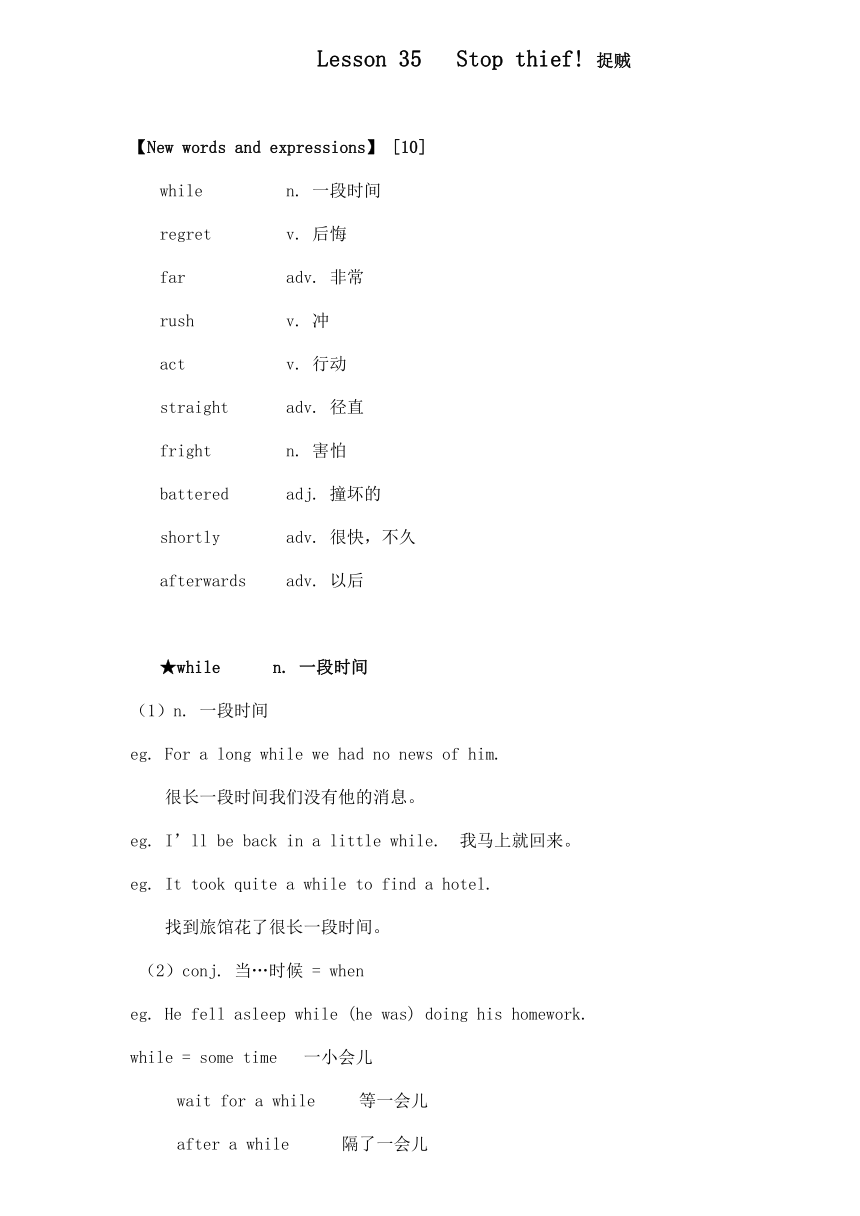 | |
| 格式 | docx | ||
| 文件大小 | 29.2KB | ||
| 资源类型 | 教案 | ||
| 版本资源 | 新概念英语 | ||
| 科目 | 英语 | ||
| 更新时间 | 2023-09-26 06:56:35 | ||
图片预览

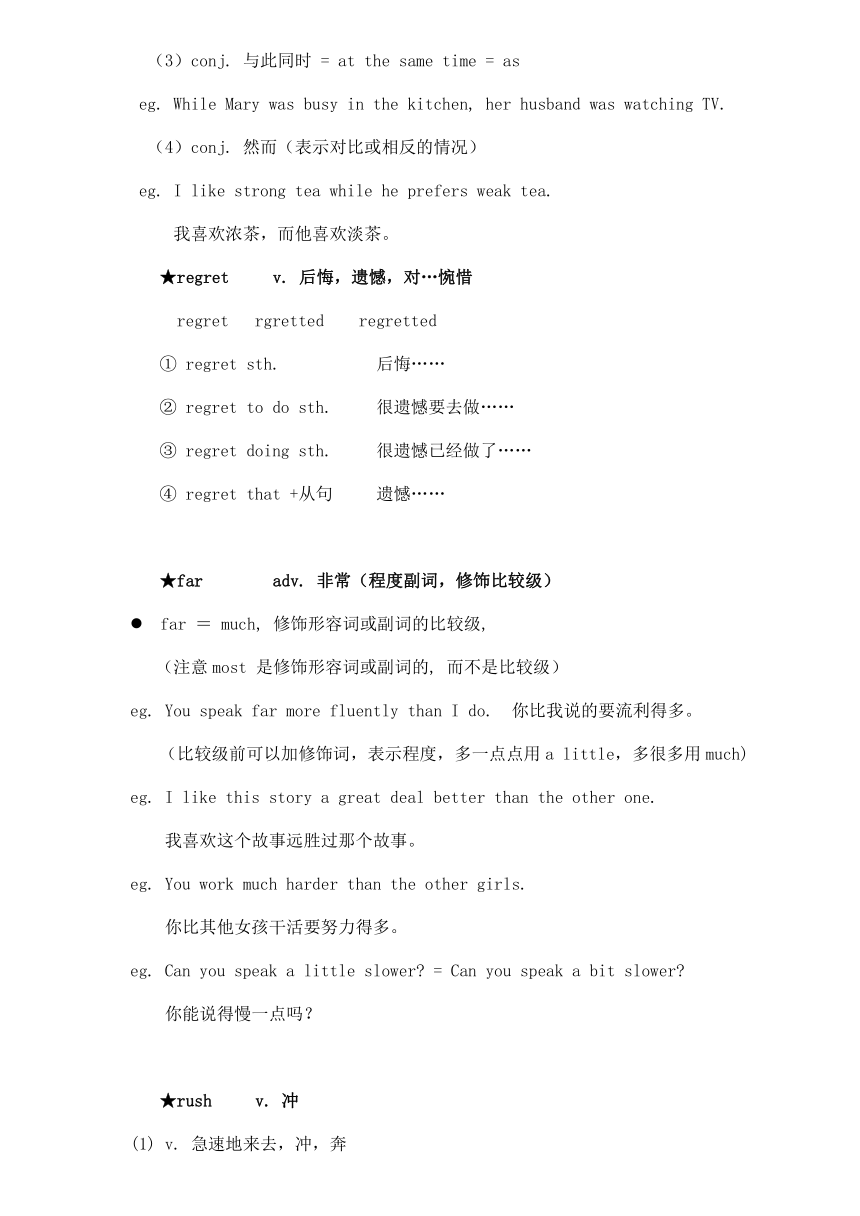
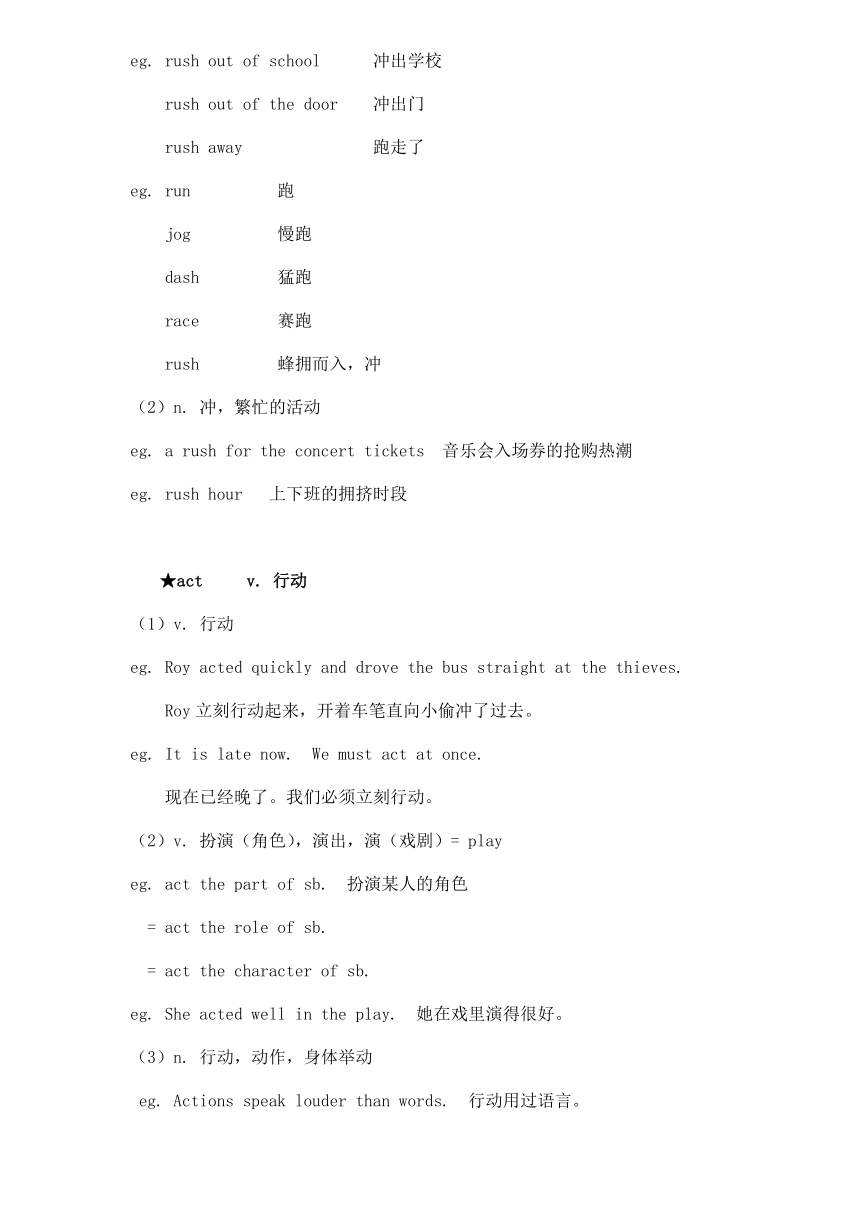
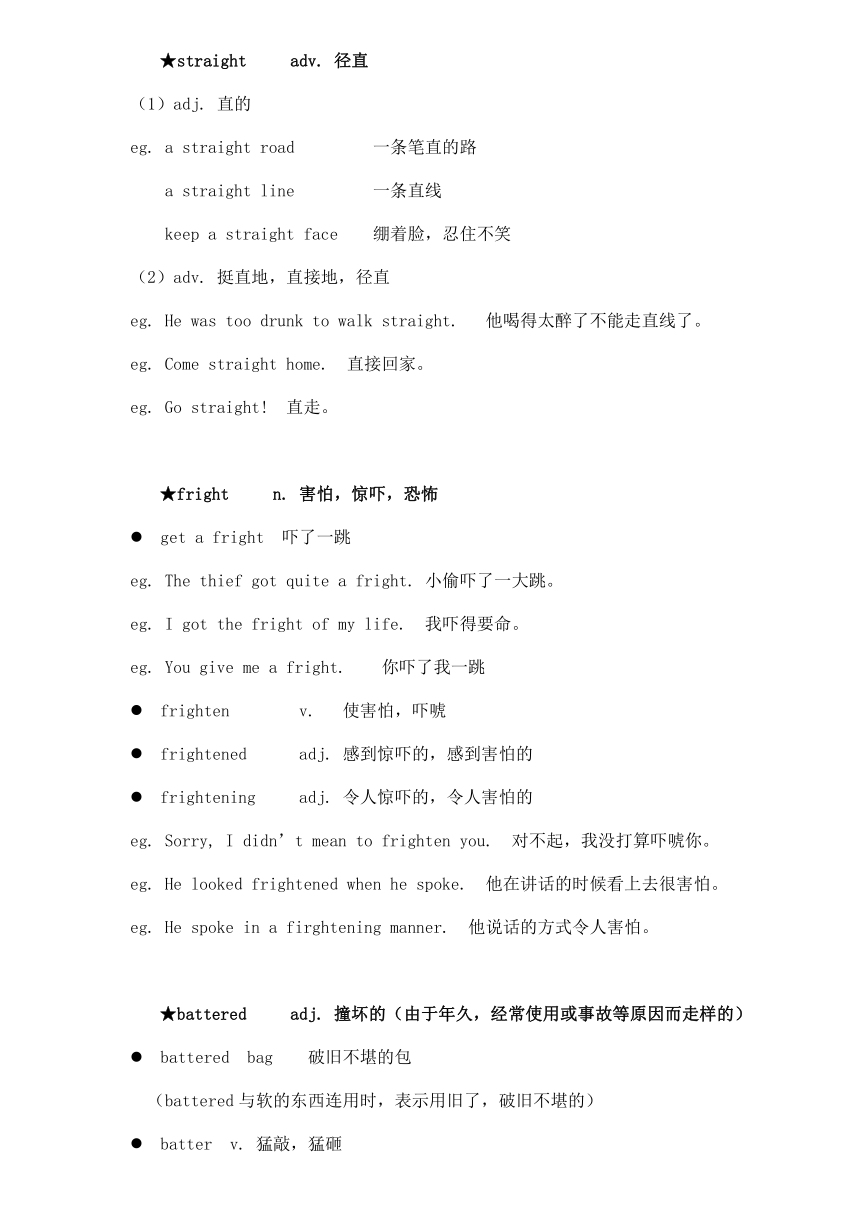
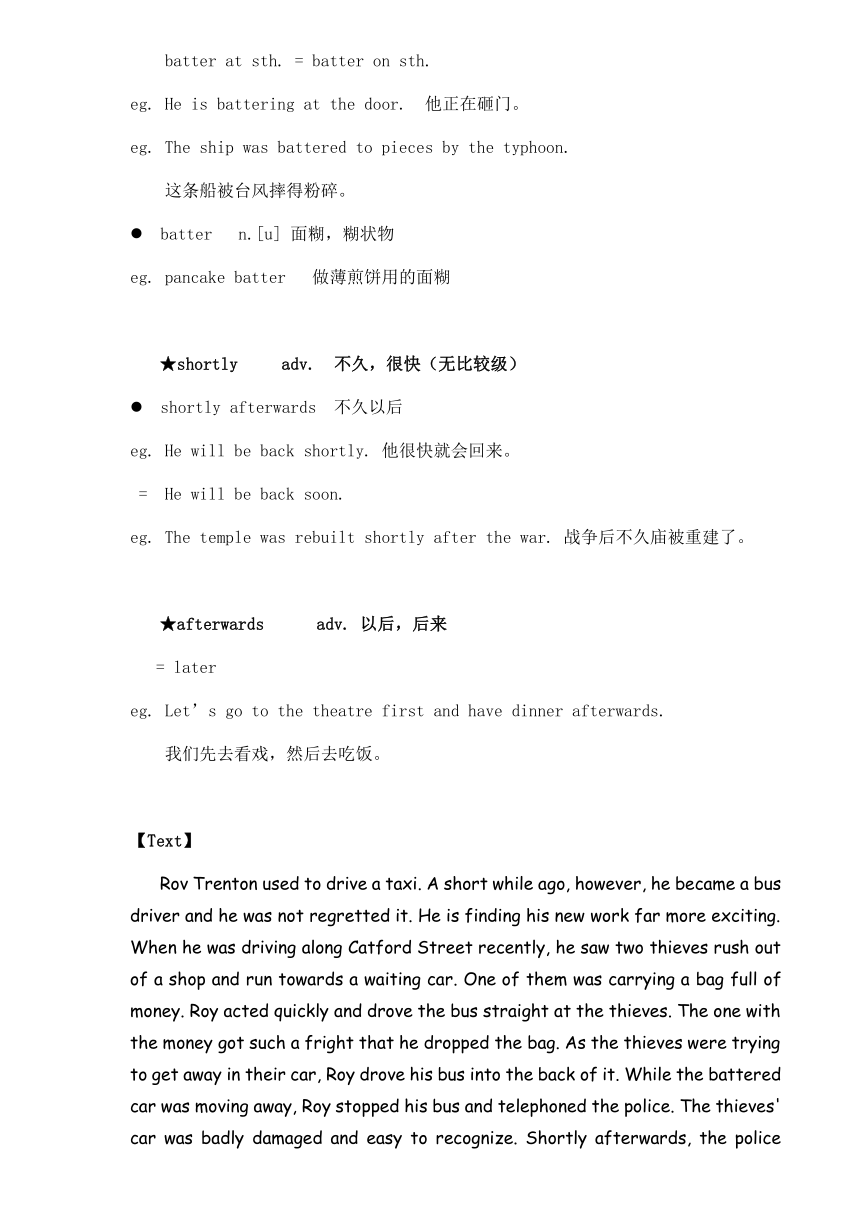
文档简介
Lesson 35 Stop thief! 捉贼
【New words and expressions】 [10]
while n. 一段时间
regret v. 后悔
far adv. 非常
rush v. 冲
act v. 行动
straight adv. 径直
fright n. 害怕
battered adj. 撞坏的
shortly adv. 很快,不久
afterwards adv. 以后
★while n. 一段时间
n. 一段时间
eg. For a long while we had no news of him.
很长一段时间我们没有他的消息。
eg. I’ll be back in a little while. 我马上就回来。
eg. It took quite a while to find a hotel.
找到旅馆花了很长一段时间。
(2)conj. 当…时候 = when
eg. He fell asleep while (he was) doing his homework.
while = some time 一小会儿
wait for a while 等一会儿
after a while 隔了一会儿
(3)conj. 与此同时 = at the same time = as
eg. While Mary was busy in the kitchen, her husband was watching TV.
(4)conj. 然而(表示对比或相反的情况)
eg. I like strong tea while he prefers weak tea.
我喜欢浓茶,而他喜欢淡茶。
★regret v. 后悔,遗憾,对…惋惜
regret rgretted regretted
① regret sth. 后悔……
② regret to do sth. 很遗憾要去做……
③ regret doing sth. 很遗憾已经做了……
④ regret that +从句 遗憾……
★far adv. 非常(程度副词,修饰比较级)
far = much, 修饰形容词或副词的比较级,
(注意most 是修饰形容词或副词的, 而不是比较级)
eg. You speak far more fluently than I do. 你比我说的要流利得多。
(比较级前可以加修饰词,表示程度,多一点点用a little,多很多用much)
eg. I like this story a great deal better than the other one.
我喜欢这个故事远胜过那个故事。
eg. You work much harder than the other girls.
你比其他女孩干活要努力得多。
eg. Can you speak a little slower = Can you speak a bit slower
你能说得慢一点吗?
★rush v. 冲
v. 急速地来去,冲,奔
eg. rush out of school 冲出学校
rush out of the door 冲出门
rush away 跑走了
eg. run 跑
jog 慢跑
dash 猛跑
race 赛跑
rush 蜂拥而入,冲
(2)n. 冲,繁忙的活动
eg. a rush for the concert tickets 音乐会入场券的抢购热潮
eg. rush hour 上下班的拥挤时段
★act v. 行动
v. 行动
eg. Roy acted quickly and drove the bus straight at the thieves.
Roy立刻行动起来,开着车笔直向小偷冲了过去。
eg. It is late now. We must act at once.
现在已经晚了。我们必须立刻行动。
v. 扮演(角色),演出,演(戏剧)= play
eg. act the part of sb. 扮演某人的角色
= act the role of sb.
= act the character of sb.
eg. She acted well in the play. 她在戏里演得很好。
n. 行动,动作,身体举动
eg. Actions speak louder than words. 行动用过语言。
★straight adv. 径直
adj. 直的
eg. a straight road 一条笔直的路
a straight line 一条直线
keep a straight face 绷着脸,忍住不笑
adv. 挺直地,直接地,径直
eg. He was too drunk to walk straight. 他喝得太醉了不能走直线了。
e straight home. 直接回家。
eg. Go straight! 直走。
★fright n. 害怕,惊吓,恐怖
get a fright 吓了一跳
eg. The thief got quite a fright. 小偷吓了一大跳。
eg. I got the fright of my life. 我吓得要命。
eg. You give me a fright. 你吓了我一跳
frighten v. 使害怕,吓唬
frightened adj. 感到惊吓的,感到害怕的
frightening adj. 令人惊吓的,令人害怕的
eg. Sorry, I didn’t mean to frighten you. 对不起,我没打算吓唬你。
eg. He looked frightened when he spoke. 他在讲话的时候看上去很害怕。
eg. He spoke in a firghtening manner. 他说话的方式令人害怕。
★battered adj. 撞坏的(由于年久,经常使用或事故等原因而走样的)
battered bag 破旧不堪的包
(battered与软的东西连用时,表示用旧了,破旧不堪的)
batter v. 猛敲,猛砸
batter at sth. = batter on sth.
eg. He is battering at the door. 他正在砸门。
eg. The ship was battered to pieces by the typhoon.
这条船被台风摔得粉碎。
batter n.[u] 面糊,糊状物
eg. pancake batter 做薄煎饼用的面糊
★shortly adv. 不久,很快(无比较级)
shortly afterwards 不久以后
eg. He will be back shortly. 他很快就会回来。
= He will be back soon.
eg. The temple was rebuilt shortly after the war. 战争后不久庙被重建了。
★afterwards adv. 以后,后来
= later
eg. Let’s go to the theatre first and have dinner afterwards.
我们先去看戏,然后去吃饭。
【Text】
Rov Trenton used to drive a taxi. A short while ago, however, he became a bus driver and he was not regretted it. He is finding his new work far more exciting. When he was driving along Catford Street recently, he saw two thieves rush out of a shop and run towards a waiting car. One of them was carrying a bag full of money. Roy acted quickly and drove the bus straight at the thieves. The one with the money got such a fright that he dropped the bag. As the thieves were trying to get away in their car, Roy drove his bus into the back of it. While the battered car was moving away, Roy stopped his bus and telephoned the police. The thieves' car was badly damaged and easy to recognize. Shortly afterwards, the police stopped the car and both men were arrested.
参考译文
罗伊·特雷顿原是开出租汽车的, 然而就在前不久, 他开上了公共汽车, 也并不为此而感到后悔. 他发觉自己的新工作令人兴奋得多. 最近, 当他正开车在凯特福德街上行驶时, 看到有两个小偷从一家商店里冲出来, 奔向等在那里的一辆汽车, 其中一个提着一只装满钞票的提包. 罗伊行动迅速, 开车直冲窃贼而去. 拿钱的那个小偷吓得把提包都扔了. 当那两个小偷企图乘车逃跑时, 罗伊驾驶他的公共汽车撞在了那辆车的后尾上. 当那辆被撞坏的车开走后, 罗伊停下车, 给警察挂了电话. 小偷的车损坏严重, 很容易辨认. 没过多久, 警察就截住了那辆车, 两个小偷都被抓住了.
【课文讲解】
1、Roy Trenton used to drive a taxi.
used to do sth. 过去常常做某事(L:31 Success story)
2、A short while ago, however, he became a bus driver and he was not regretted it.
a short while ago = a short time ago = not long ago 不久以前
while作名词表示“一会儿,(一段)时间”时常与a连用,有时也与the,this等连用:
however可以放句首、句中、句末,放在句中时,前后用逗号分开;如果一个词两边有逗号,证明这个词是插入语。but置于句首,不如however正式。
3、He is finding his new work far more exciting.
find + 宾语 + adj.宾语补足语,find可以用一般现在时态, 可以用进行时态
far more exciting 远兴奋得多(在形容词和副词的比较级与最高级前面,可以用far(相当much)来表示强调,译为“很,大大的”)
much more exciting 令人兴奋得多
even more exciting 甚至更令人兴奋
a little more exciting 令人兴奋一点
less exciting 不如原来兴奋
When he was driving along Catford Street recently, he saw two thieves rush out of a shop and run towards a waiting car.
drive along(prep. 沿着) 沿着…开
eg. Go straight along the street. 沿着这条路直走。
eg. walk along the street(通用) 沿街走
= walk up the street (朝北)
= walk down the street(朝南)
see sb. do sth. 看见某人做某事
(通常表示动作发生完了,强调看了全过程)
see sb. doing sth. 看见某人正在做某事
(只看了一部分)
see和一些感官动词(如smell, feel, hear, watch, notice等)可以用在动词+名词/代词宾语+不带to的不定式结构(省略to)中,如果全过程用do,过程中的一瞬间用doing:
同:hear sb doing sth.,hear sb. do sth.
a waiting car 是现在分词做定语。(一辆正在等候的车)
One of them was carrying a bag full of money.
full of money做后置定语修饰bag(a bag which was full of money)
carry v. 搬运,携带
carry a big sum of money 携带着一大笔钱
carry out 实施(计划),履行(义务),进行(实验)
eg. The plan should be carried out immediately. 这个计划应该立刻被实施
carry away 吸引住,使忘我(用被动)
eg. The audience was carried away by her songs. 观众被她的歌吸引住了。
6、Roy acted quickly and drove the bus straight at the thieves. The one with the money got such a fright that he dropped the bag.
The one with the money 拿着钱的小偷
with prep.
与…在一起,偕同
(with 一旦出现在名词或代词后就做定语, 出现在动词之后做状语)
eg. He came in with a book. (作状语)
The boy with a book came in. (作定语)
有…的(本身固有的成分)
eg. a girl with long hair 一个长发女孩
a house with a blue roof 有蓝屋顶的房子
随身携带
eg. I have no money with me. 我没带钱
以…,用…(方式)
eg. eat with a knife annd fork 用刀和叉吃
以…材料
eg. A cake made with fruit. 一个水果蛋糕。
got such a fright that he dropped the bag
such…that… 如此…以致于…
so + adj./adv. + that 表程度 (so adv./conj.)
such + n. + that (such adj.)
当名词是可数名词复数或不可数名词时,用such修饰。
当名词前面有many, much, little, few修饰,强调“多少”,用so修饰。
eg. He is such a boring person that I won’t have even one word with him
again. 他是一个如此烦的人,我再也不和他说话了。
= He is so boring that…
7、As the thieves were trying to get away in their car, Roy drove his bus into the back of it.
as = when 当……时候
get away = run away 逃跑
into 进入
8、While the battered car was moving away, Roy stopped his bus and telephoned the police.
stopped his car 强调人为停车
his car stopped 强调车停下来
9、The thieves' car was badly damaged and easy to recognize.
was badly damaged = was seriously damaged 被严重损坏
damaged v. 损坏,损害
eg. Smoking can damage your health. 吸烟有害健康。
…and easy to recognize = and the car was easy to recognize
(用主动表被动含义)
如果一个不定式的前面是一个形容词, 如果主句的结局是“系表结构+to”,不定式当中常用主动表被动, 在不定式的表达方式当中, 动词的宾语如果刚好是这句话的主语, 这个宾语一定不能出现
eg. The apple is sweet enough to eat.
The apple is too sour to eat. (sour adj. 酸的)
The question is easy enough to answer.
The boy is enough clever to answer the question.
这个小孩足够聪明以至于能回答这个问题。
(the question不是主语故一定要出现)
文中 “…easy to recognize(car)” 因car是主语, 所以不能出现
在不定式当中, 也许有可能用主动表达被动含义, 及物动词后面一般加宾语(这个宾语就是这句话的主语就不加), 又如:The clothes are too comfortable to ware.
10、Shortly afterwards, the police stopped the car and both men were arrested.
shortly afterwards = soon = in no time 没过多久
both men = two persons
【Key Structures】
1. 带有频度副词的一般现在时
eg. These things always happen.
2. 一般过去时
eg. What happened
现在完成时
eg. What has happened
used to do 过去常常做某事
eg. He used to work 14 hours a day.
被动语态
eg. He was asked to call at the station.
【New words and expressions】 [10]
while n. 一段时间
regret v. 后悔
far adv. 非常
rush v. 冲
act v. 行动
straight adv. 径直
fright n. 害怕
battered adj. 撞坏的
shortly adv. 很快,不久
afterwards adv. 以后
★while n. 一段时间
n. 一段时间
eg. For a long while we had no news of him.
很长一段时间我们没有他的消息。
eg. I’ll be back in a little while. 我马上就回来。
eg. It took quite a while to find a hotel.
找到旅馆花了很长一段时间。
(2)conj. 当…时候 = when
eg. He fell asleep while (he was) doing his homework.
while = some time 一小会儿
wait for a while 等一会儿
after a while 隔了一会儿
(3)conj. 与此同时 = at the same time = as
eg. While Mary was busy in the kitchen, her husband was watching TV.
(4)conj. 然而(表示对比或相反的情况)
eg. I like strong tea while he prefers weak tea.
我喜欢浓茶,而他喜欢淡茶。
★regret v. 后悔,遗憾,对…惋惜
regret rgretted regretted
① regret sth. 后悔……
② regret to do sth. 很遗憾要去做……
③ regret doing sth. 很遗憾已经做了……
④ regret that +从句 遗憾……
★far adv. 非常(程度副词,修饰比较级)
far = much, 修饰形容词或副词的比较级,
(注意most 是修饰形容词或副词的, 而不是比较级)
eg. You speak far more fluently than I do. 你比我说的要流利得多。
(比较级前可以加修饰词,表示程度,多一点点用a little,多很多用much)
eg. I like this story a great deal better than the other one.
我喜欢这个故事远胜过那个故事。
eg. You work much harder than the other girls.
你比其他女孩干活要努力得多。
eg. Can you speak a little slower = Can you speak a bit slower
你能说得慢一点吗?
★rush v. 冲
v. 急速地来去,冲,奔
eg. rush out of school 冲出学校
rush out of the door 冲出门
rush away 跑走了
eg. run 跑
jog 慢跑
dash 猛跑
race 赛跑
rush 蜂拥而入,冲
(2)n. 冲,繁忙的活动
eg. a rush for the concert tickets 音乐会入场券的抢购热潮
eg. rush hour 上下班的拥挤时段
★act v. 行动
v. 行动
eg. Roy acted quickly and drove the bus straight at the thieves.
Roy立刻行动起来,开着车笔直向小偷冲了过去。
eg. It is late now. We must act at once.
现在已经晚了。我们必须立刻行动。
v. 扮演(角色),演出,演(戏剧)= play
eg. act the part of sb. 扮演某人的角色
= act the role of sb.
= act the character of sb.
eg. She acted well in the play. 她在戏里演得很好。
n. 行动,动作,身体举动
eg. Actions speak louder than words. 行动用过语言。
★straight adv. 径直
adj. 直的
eg. a straight road 一条笔直的路
a straight line 一条直线
keep a straight face 绷着脸,忍住不笑
adv. 挺直地,直接地,径直
eg. He was too drunk to walk straight. 他喝得太醉了不能走直线了。
e straight home. 直接回家。
eg. Go straight! 直走。
★fright n. 害怕,惊吓,恐怖
get a fright 吓了一跳
eg. The thief got quite a fright. 小偷吓了一大跳。
eg. I got the fright of my life. 我吓得要命。
eg. You give me a fright. 你吓了我一跳
frighten v. 使害怕,吓唬
frightened adj. 感到惊吓的,感到害怕的
frightening adj. 令人惊吓的,令人害怕的
eg. Sorry, I didn’t mean to frighten you. 对不起,我没打算吓唬你。
eg. He looked frightened when he spoke. 他在讲话的时候看上去很害怕。
eg. He spoke in a firghtening manner. 他说话的方式令人害怕。
★battered adj. 撞坏的(由于年久,经常使用或事故等原因而走样的)
battered bag 破旧不堪的包
(battered与软的东西连用时,表示用旧了,破旧不堪的)
batter v. 猛敲,猛砸
batter at sth. = batter on sth.
eg. He is battering at the door. 他正在砸门。
eg. The ship was battered to pieces by the typhoon.
这条船被台风摔得粉碎。
batter n.[u] 面糊,糊状物
eg. pancake batter 做薄煎饼用的面糊
★shortly adv. 不久,很快(无比较级)
shortly afterwards 不久以后
eg. He will be back shortly. 他很快就会回来。
= He will be back soon.
eg. The temple was rebuilt shortly after the war. 战争后不久庙被重建了。
★afterwards adv. 以后,后来
= later
eg. Let’s go to the theatre first and have dinner afterwards.
我们先去看戏,然后去吃饭。
【Text】
Rov Trenton used to drive a taxi. A short while ago, however, he became a bus driver and he was not regretted it. He is finding his new work far more exciting. When he was driving along Catford Street recently, he saw two thieves rush out of a shop and run towards a waiting car. One of them was carrying a bag full of money. Roy acted quickly and drove the bus straight at the thieves. The one with the money got such a fright that he dropped the bag. As the thieves were trying to get away in their car, Roy drove his bus into the back of it. While the battered car was moving away, Roy stopped his bus and telephoned the police. The thieves' car was badly damaged and easy to recognize. Shortly afterwards, the police stopped the car and both men were arrested.
参考译文
罗伊·特雷顿原是开出租汽车的, 然而就在前不久, 他开上了公共汽车, 也并不为此而感到后悔. 他发觉自己的新工作令人兴奋得多. 最近, 当他正开车在凯特福德街上行驶时, 看到有两个小偷从一家商店里冲出来, 奔向等在那里的一辆汽车, 其中一个提着一只装满钞票的提包. 罗伊行动迅速, 开车直冲窃贼而去. 拿钱的那个小偷吓得把提包都扔了. 当那两个小偷企图乘车逃跑时, 罗伊驾驶他的公共汽车撞在了那辆车的后尾上. 当那辆被撞坏的车开走后, 罗伊停下车, 给警察挂了电话. 小偷的车损坏严重, 很容易辨认. 没过多久, 警察就截住了那辆车, 两个小偷都被抓住了.
【课文讲解】
1、Roy Trenton used to drive a taxi.
used to do sth. 过去常常做某事(L:31 Success story)
2、A short while ago, however, he became a bus driver and he was not regretted it.
a short while ago = a short time ago = not long ago 不久以前
while作名词表示“一会儿,(一段)时间”时常与a连用,有时也与the,this等连用:
however可以放句首、句中、句末,放在句中时,前后用逗号分开;如果一个词两边有逗号,证明这个词是插入语。but置于句首,不如however正式。
3、He is finding his new work far more exciting.
find + 宾语 + adj.宾语补足语,find可以用一般现在时态, 可以用进行时态
far more exciting 远兴奋得多(在形容词和副词的比较级与最高级前面,可以用far(相当much)来表示强调,译为“很,大大的”)
much more exciting 令人兴奋得多
even more exciting 甚至更令人兴奋
a little more exciting 令人兴奋一点
less exciting 不如原来兴奋
When he was driving along Catford Street recently, he saw two thieves rush out of a shop and run towards a waiting car.
drive along(prep. 沿着) 沿着…开
eg. Go straight along the street. 沿着这条路直走。
eg. walk along the street(通用) 沿街走
= walk up the street (朝北)
= walk down the street(朝南)
see sb. do sth. 看见某人做某事
(通常表示动作发生完了,强调看了全过程)
see sb. doing sth. 看见某人正在做某事
(只看了一部分)
see和一些感官动词(如smell, feel, hear, watch, notice等)可以用在动词+名词/代词宾语+不带to的不定式结构(省略to)中,如果全过程用do,过程中的一瞬间用doing:
同:hear sb doing sth.,hear sb. do sth.
a waiting car 是现在分词做定语。(一辆正在等候的车)
One of them was carrying a bag full of money.
full of money做后置定语修饰bag(a bag which was full of money)
carry v. 搬运,携带
carry a big sum of money 携带着一大笔钱
carry out 实施(计划),履行(义务),进行(实验)
eg. The plan should be carried out immediately. 这个计划应该立刻被实施
carry away 吸引住,使忘我(用被动)
eg. The audience was carried away by her songs. 观众被她的歌吸引住了。
6、Roy acted quickly and drove the bus straight at the thieves. The one with the money got such a fright that he dropped the bag.
The one with the money 拿着钱的小偷
with prep.
与…在一起,偕同
(with 一旦出现在名词或代词后就做定语, 出现在动词之后做状语)
eg. He came in with a book. (作状语)
The boy with a book came in. (作定语)
有…的(本身固有的成分)
eg. a girl with long hair 一个长发女孩
a house with a blue roof 有蓝屋顶的房子
随身携带
eg. I have no money with me. 我没带钱
以…,用…(方式)
eg. eat with a knife annd fork 用刀和叉吃
以…材料
eg. A cake made with fruit. 一个水果蛋糕。
got such a fright that he dropped the bag
such…that… 如此…以致于…
so + adj./adv. + that 表程度 (so adv./conj.)
such + n. + that (such adj.)
当名词是可数名词复数或不可数名词时,用such修饰。
当名词前面有many, much, little, few修饰,强调“多少”,用so修饰。
eg. He is such a boring person that I won’t have even one word with him
again. 他是一个如此烦的人,我再也不和他说话了。
= He is so boring that…
7、As the thieves were trying to get away in their car, Roy drove his bus into the back of it.
as = when 当……时候
get away = run away 逃跑
into 进入
8、While the battered car was moving away, Roy stopped his bus and telephoned the police.
stopped his car 强调人为停车
his car stopped 强调车停下来
9、The thieves' car was badly damaged and easy to recognize.
was badly damaged = was seriously damaged 被严重损坏
damaged v. 损坏,损害
eg. Smoking can damage your health. 吸烟有害健康。
…and easy to recognize = and the car was easy to recognize
(用主动表被动含义)
如果一个不定式的前面是一个形容词, 如果主句的结局是“系表结构+to”,不定式当中常用主动表被动, 在不定式的表达方式当中, 动词的宾语如果刚好是这句话的主语, 这个宾语一定不能出现
eg. The apple is sweet enough to eat.
The apple is too sour to eat. (sour adj. 酸的)
The question is easy enough to answer.
The boy is enough clever to answer the question.
这个小孩足够聪明以至于能回答这个问题。
(the question不是主语故一定要出现)
文中 “…easy to recognize(car)” 因car是主语, 所以不能出现
在不定式当中, 也许有可能用主动表达被动含义, 及物动词后面一般加宾语(这个宾语就是这句话的主语就不加), 又如:The clothes are too comfortable to ware.
10、Shortly afterwards, the police stopped the car and both men were arrested.
shortly afterwards = soon = in no time 没过多久
both men = two persons
【Key Structures】
1. 带有频度副词的一般现在时
eg. These things always happen.
2. 一般过去时
eg. What happened
现在完成时
eg. What has happened
used to do 过去常常做某事
eg. He used to work 14 hours a day.
被动语态
eg. He was asked to call at the station.
同课章节目录
